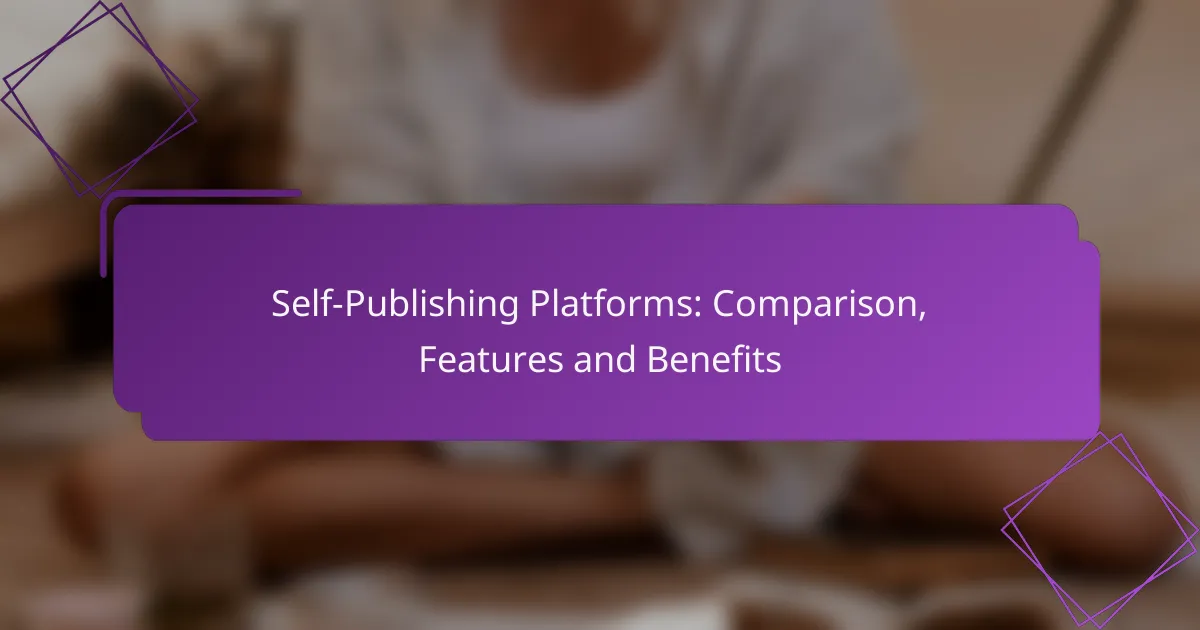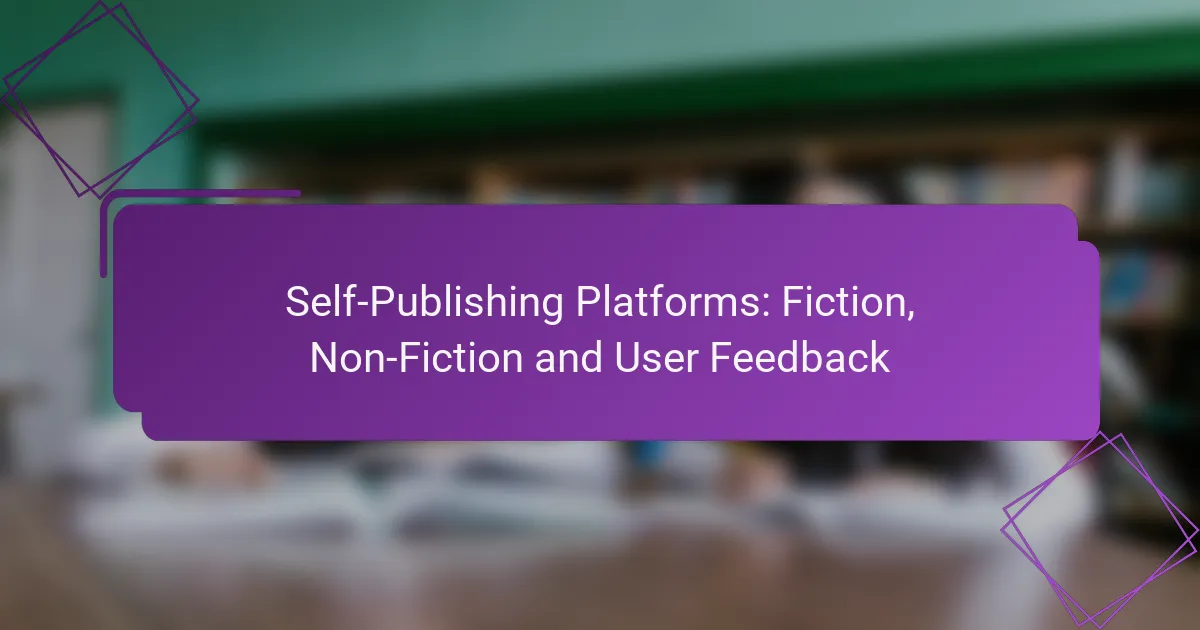Self-publishing platforms offer authors the opportunity to reach global audiences through international access and tailored features. By ensuring compliance with copyright laws and tax obligations, these platforms facilitate a smooth publishing experience while protecting authors from legal issues. Additionally, robust support options, including customer service and educational resources, empower authors to navigate the complexities of the self-publishing landscape effectively.
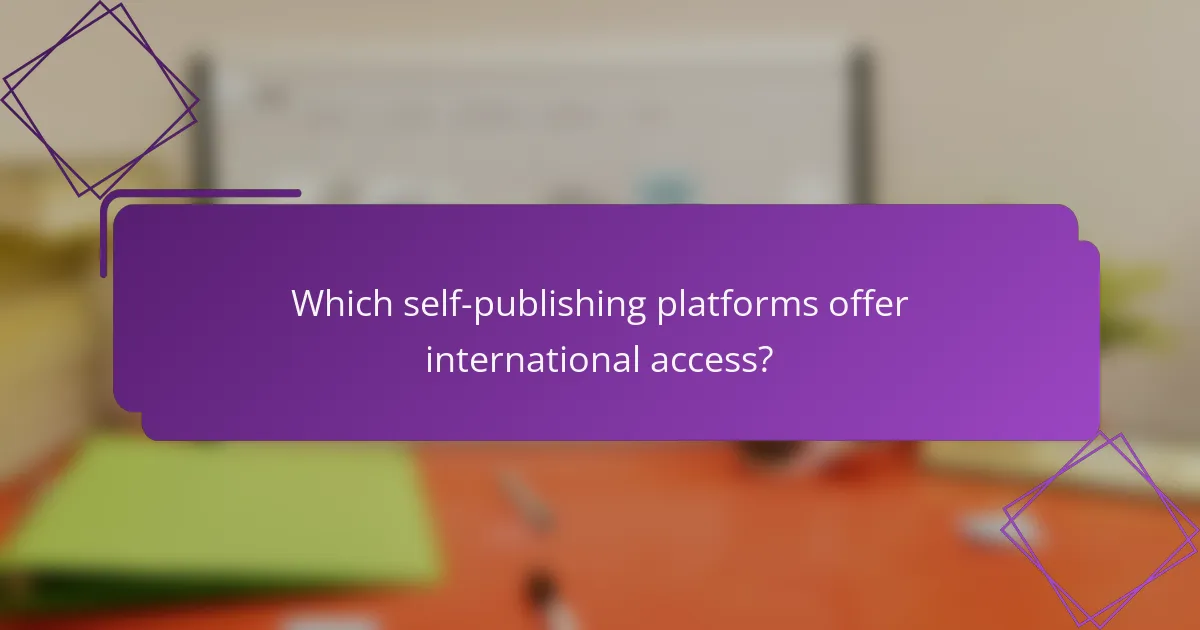
Which self-publishing platforms offer international access?
Several self-publishing platforms provide international access, allowing authors to reach global audiences. Key platforms include Amazon Kindle Direct Publishing, IngramSpark, Kobo Writing Life, Draft2Digital, and Smashwords, each with unique features and considerations for international distribution.
Amazon Kindle Direct Publishing
Amazon Kindle Direct Publishing (KDP) is one of the most popular platforms for self-publishing eBooks and paperbacks. It offers authors the ability to publish their work in multiple languages and distribute it to numerous countries, making it accessible to a vast international audience.
Authors can set their own prices and earn royalties ranging from 35% to 70%, depending on the pricing strategy and the market. KDP also provides tools for tracking sales and managing promotions, which can enhance visibility in different regions.
IngramSpark
IngramSpark is a robust platform that caters to both eBook and print publishing, with a strong focus on global distribution. It connects authors with a vast network of retailers and libraries worldwide, making it an excellent choice for those looking to reach international markets.
While IngramSpark charges setup fees, it offers extensive distribution options, including access to over 39,000 retailers. Authors should consider the costs versus the potential reach when deciding if this platform aligns with their publishing goals.
Kobo Writing Life
Kobo Writing Life allows authors to publish eBooks and distribute them to a global audience, particularly strong in markets like Canada, Europe, and Australia. The platform supports multiple languages and offers competitive royalty rates of up to 70%.
Authors can easily manage their titles and track sales through a user-friendly dashboard. Kobo also runs promotional campaigns that can help boost visibility in specific regions, making it a viable option for international authors.
Draft2Digital
Draft2Digital is a user-friendly platform that helps authors publish eBooks and distribute them to various retailers, including international options. It simplifies the publishing process by offering free formatting tools and a straightforward submission process.
Authors benefit from wide distribution, including access to libraries and international eBook retailers. Draft2Digital takes a small percentage of royalties, making it a cost-effective choice for authors looking to expand their reach without upfront fees.
Smashwords
Smashwords is another platform that offers authors a way to publish eBooks and distribute them globally. It provides access to major retailers and libraries, allowing for a wide international reach.
With a focus on independent authors, Smashwords offers various pricing options and promotional tools. However, authors should be aware of the formatting requirements, as proper formatting is crucial for successful distribution across different platforms.
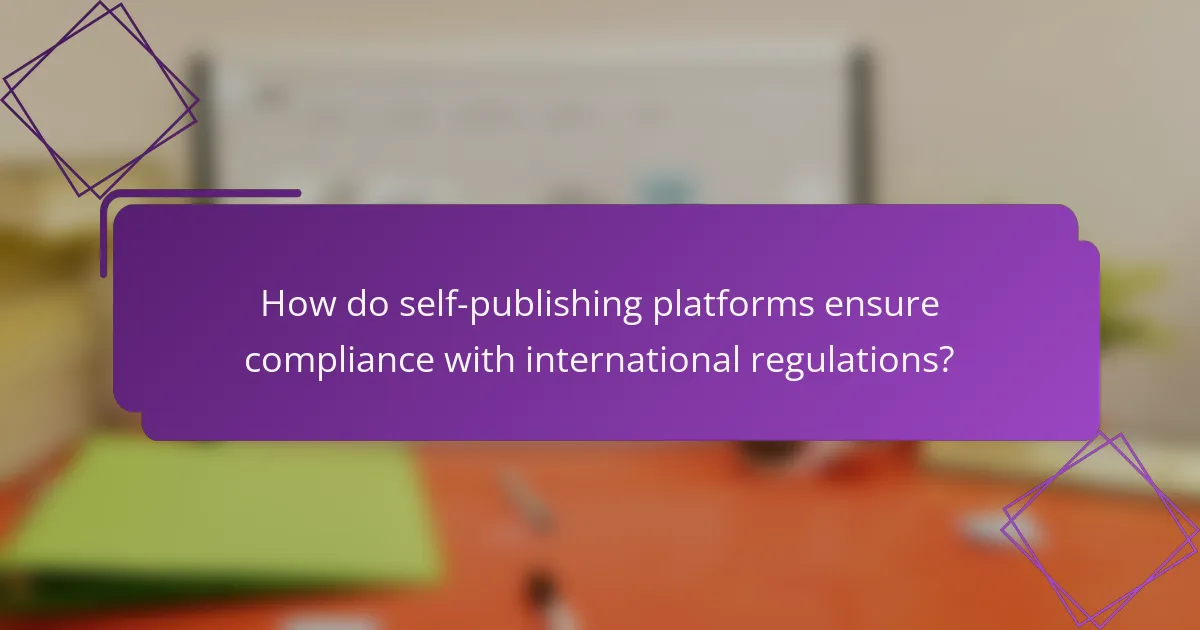
How do self-publishing platforms ensure compliance with international regulations?
Self-publishing platforms ensure compliance with international regulations by adhering to copyright laws, managing tax obligations for authors, and enforcing content guidelines. These measures help protect both the platform and the authors from legal issues while facilitating a smooth publishing process across different countries.
Copyright laws adherence
Self-publishing platforms must comply with copyright laws in various jurisdictions to protect the intellectual property of authors. This includes ensuring that authors have the rights to publish their work and that any third-party content used is properly licensed. Platforms often implement systems to verify ownership and provide tools for authors to manage their rights effectively.
For example, platforms may require authors to confirm that their work is original or that they have secured necessary permissions for any included materials. Failure to adhere to copyright laws can lead to legal disputes and financial penalties.
Tax compliance for authors
Tax compliance is crucial for self-publishing authors, as they may be subject to different tax regulations depending on their country of residence and where their sales occur. Many platforms provide resources to help authors understand their tax obligations, including withholding taxes and reporting income accurately.
For instance, authors in the United States may need to fill out a W-9 form for tax identification, while those in the European Union might encounter VAT regulations. It’s essential for authors to consult local tax authorities or professionals to ensure compliance and avoid potential fines.
Content guidelines and restrictions
Self-publishing platforms enforce content guidelines and restrictions to maintain quality and adhere to legal standards. These guidelines often prohibit hate speech, explicit content, and plagiarism, ensuring that published works meet community standards and legal requirements. Authors should familiarize themselves with these rules to avoid having their work removed or facing account penalties.
For example, platforms may have specific policies regarding the use of copyrighted images or language that could be deemed offensive. Authors should review the platform’s content policies carefully and consider using content moderation tools provided by the platform to ensure compliance before publishing.
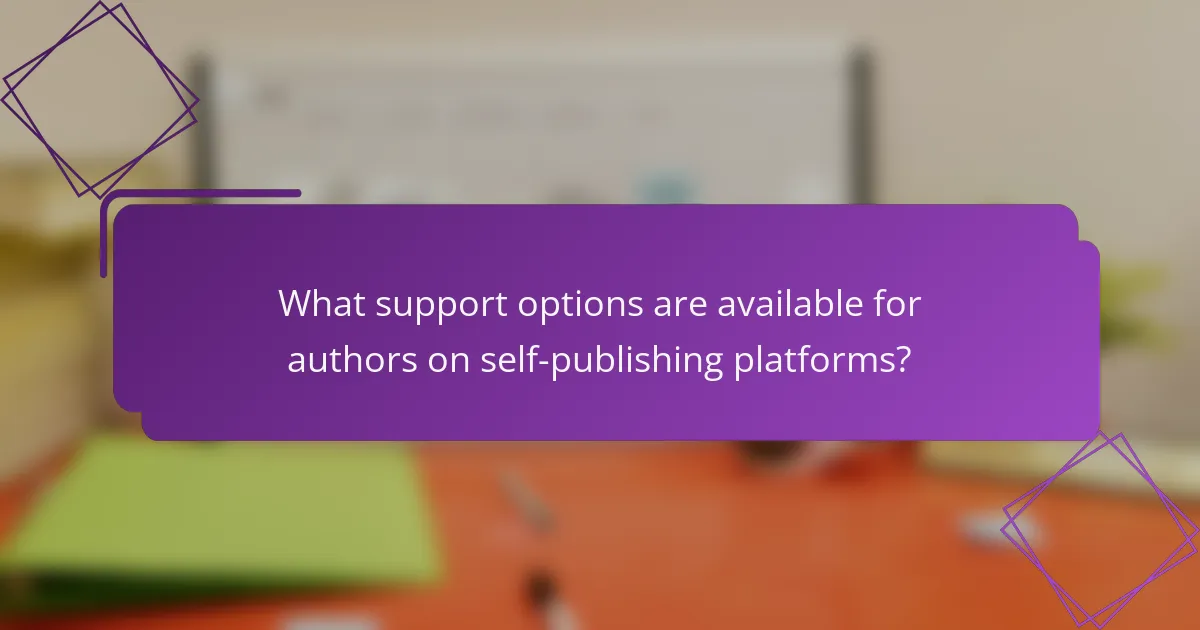
What support options are available for authors on self-publishing platforms?
Authors on self-publishing platforms can access various support options, including customer service, community forums, and educational resources. These avenues help authors navigate the complexities of publishing, marketing, and distribution.
Customer service channels
Most self-publishing platforms offer multiple customer service channels to assist authors. Common options include email support, live chat, and phone assistance. Response times can vary, but many platforms aim to address inquiries within 24 to 48 hours.
When seeking help, it’s beneficial to have specific questions ready to streamline the process. Some platforms may also provide a ticketing system for tracking the status of your inquiries.
Community forums and resources
Community forums are valuable resources where authors can connect, share experiences, and seek advice. These forums often feature discussions on best practices, marketing strategies, and troubleshooting common issues.
Additionally, many platforms maintain a knowledge base or FAQ section that covers frequently asked questions and provides step-by-step guides. Engaging in these communities can enhance your understanding and provide support from fellow authors.
Author education and webinars
Self-publishing platforms frequently offer educational resources, including webinars and online courses tailored for authors. These sessions cover topics such as writing techniques, marketing strategies, and navigating the publishing process.
Participating in these educational opportunities can significantly improve your skills and confidence as an author. Look for platforms that provide regular updates and new content to stay informed about industry trends and best practices.
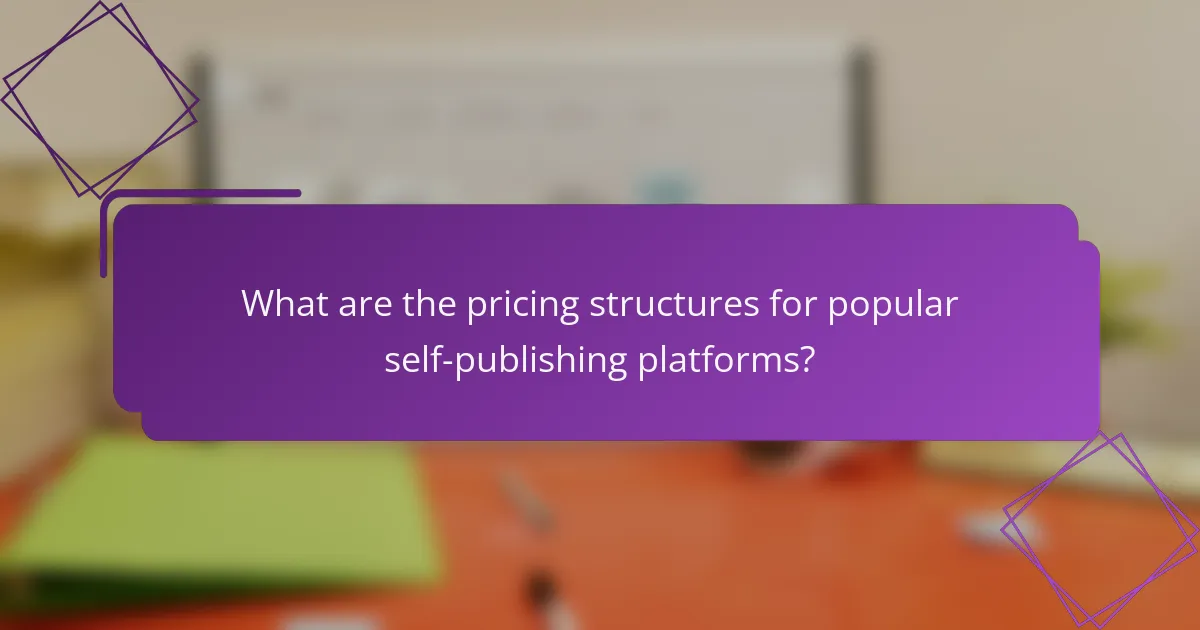
What are the pricing structures for popular self-publishing platforms?
Popular self-publishing platforms have varied pricing structures that can significantly impact an author’s earnings and upfront costs. Understanding these fees is crucial for authors to choose the best platform for their needs.
Amazon Kindle Direct Publishing fees
Amazon Kindle Direct Publishing (KDP) operates on a royalty-based system. Authors can earn 35% or 70% royalties on eBook sales, depending on the book’s price and distribution choices. For example, books priced between $2.99 and $9.99 qualify for the 70% royalty rate, while those outside this range earn 35%.
Additionally, KDP charges delivery fees for books sold at the 70% royalty rate, which is based on file size. Authors should consider these fees when setting their book prices to maximize earnings.
IngramSpark setup costs
IngramSpark charges a setup fee for authors looking to publish print and eBooks. The typical setup cost ranges from $49 to $99, depending on the type of book and any additional services selected. Authors can also incur costs for revisions or updates to their titles.
While IngramSpark offers extensive distribution options, authors should weigh the upfront costs against the potential for wider reach in bookstores and libraries. It’s advisable to check for promotional codes that may waive setup fees.
Kobo Writing Life royalties
Kobo Writing Life provides authors with a straightforward royalty structure, offering 70% royalties on eBooks priced between $2.99 and $9.99. For books priced outside this range, the royalty drops to 45%. This makes Kobo an attractive option for authors targeting international markets.
Authors should also consider that Kobo allows for global distribution, which can enhance visibility and sales potential. Regularly reviewing sales data can help authors adjust pricing strategies effectively.

How do self-publishing platforms compare in terms of features?
Self-publishing platforms vary significantly in features, impacting authors’ choices based on their specific needs. Key areas of comparison include distribution reach, formatting tools, and marketing features, which can determine the success of a self-published book.
Distribution reach comparison
Distribution reach is crucial for maximizing a book’s visibility. Some platforms, like Amazon Kindle Direct Publishing (KDP), offer extensive global distribution, while others may focus on specific regions or formats. Authors should consider whether they want to reach international markets or prefer localized distribution.
For instance, platforms like IngramSpark provide access to a wide range of bookstores and libraries, making them suitable for authors aiming for a physical presence. In contrast, platforms like Lulu may cater more to niche markets or specific genres.
Formatting tools and support
Formatting tools can greatly simplify the self-publishing process. Many platforms offer user-friendly templates and step-by-step guides to help authors format their manuscripts correctly. For example, KDP provides a free formatting tool that can convert manuscripts into eBook formats.
However, not all platforms offer the same level of support. Some may provide extensive resources, including video tutorials and customer service, while others might leave authors to navigate formatting challenges independently. Authors should assess their own technical skills when choosing a platform.
Marketing features overview
Marketing features are essential for promoting a self-published book. Some platforms include built-in promotional tools, such as discount options and advertising services, which can help authors reach a broader audience. For example, KDP offers promotional pricing and Kindle Unlimited options to boost visibility.
On the other hand, platforms like Smashwords focus on distribution but may lack comprehensive marketing tools. Authors should evaluate the marketing capabilities of each platform to ensure they align with their promotional strategies and budget.

What are the prerequisites for using self-publishing platforms?
To use self-publishing platforms, you typically need a valid email address, a bank account for payments, and compliance with the platform’s terms and conditions. Additionally, understanding copyright laws and having a manuscript ready for publication are essential steps.
Account setup requirements
Setting up an account on a self-publishing platform usually involves providing personal information, including your name, email address, and payment details. Most platforms require you to verify your email to activate your account, ensuring that you have access to the communication necessary for publishing.
Many platforms also ask for tax information, such as a Social Security Number (SSN) or an International Taxpayer Identification Number (ITIN), especially if you are based in the United States. This is crucial for compliance with tax regulations and to facilitate royalty payments.
Be prepared to select your publishing preferences during account setup. This may include choosing the genres you want to publish in, setting pricing for your books, and deciding on distribution channels. Taking time to understand these options can significantly impact your book’s reach and profitability.


